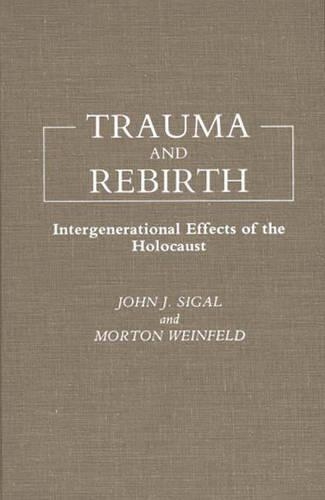
Trauma and Rebirth: Intergenerational Effects of the Holocaust
(Hardback)
Publishing Details
Trauma and Rebirth: Intergenerational Effects of the Holocaust
By (Author) John J. Sigal
By (author) Morton Weinfeld
Bloomsbury Publishing PLC
Praeger Publishers Inc
1st June 1989
United States
Classifications
Tertiary Education
Non Fiction
Second World War
Modern warfare
European history
940.5318
Physical Properties
Hardback
221
Description
This volume examines the long-term consequences of the Holocaust on survivors and their children some four decades after the war. This book represents the culmination of nine years of collaborative effort, consisting primarily of findings drawn from two sample surveys of Jewish residents in Montreal. This volume covers new research topics that have been neglected in the survivor literature, including personality, familial interactions, vocational achievements, sociopolitical attitudes. an excellent source of material from a sociopolitical and psychological perspective. The assessment of the impact of a political movement on the attitudes and psychological status of a minority population is informative. The study of a large group of Holocaust survivors adds significantly to the scientific literature in this area. Contemporary Psychology The first empirical study of the psychological consequences of the Holocaust across three generations, this book assesses the long-term and intergenerational effects of severe victimization and of other forms of exposure to excessive, prolonged stress. Although there can be no doubt that there are negative psychological and physical consequences for the survivors of the Holocaust, the authors present evidence here that contradicts the dominant thrust of previous studies, which emphasized dysfunction in the family life of survivors and psychological impairment in their children. In addition to an intensive study of Holocaust survivors and their families, this book provides a yardstick against which the long-term and cross-generational impact of other potentially traumatic situations--war, earthquakes, flood, fire, assault, and so on--may be measured. The authors' research for this volume spans the disciplines of psychology, psychiatry, sociology, history, and ethnic studies. The book, however, is written in an accessible style easily understood by the nonprofessional reader. The culmination of a nine year collaborative effort, Trauma and Rebirth consists, primarily, of findings drawn from two sample surveys of Jewish residents in Montreal. One survey focuses on Holocaust survivors, the second on children of survivors. Both include control groups, and draw from unbiased, nonclinical, and non-self-selected populations. Students and scholars of modern Jewish life and the Holocaust, or anyone interested in the study of trauma and victimization, will find Trauma and Rebirth an invaluable resource.
Reviews
Sigal and Weinfeld have produced a useful work. It contributes to the entire area of trauma and stress and deserves a wide readership. The fact that its focus is on the Jewish Holocaust survivors should not deter the reader. All students of the consequences of extreme victimization will benefit from the insight presented. While acknowleding the severity of the traumatic insult, Sigal and Weinfeld instill a degree of hope with respect to human resilience, adaptation, and dignity. The reader is well rewarded.-American Journal of Psychotherapy
"Sigal and Weinfeld have produced a useful work. It contributes to the entire area of trauma and stress and deserves a wide readership. The fact that its focus is on the Jewish Holocaust survivors should not deter the reader. All students of the consequences of extreme victimization will benefit from the insight presented. While acknowleding the severity of the traumatic insult, Sigal and Weinfeld instill a degree of hope with respect to human resilience, adaptation, and dignity. The reader is well rewarded."-American Journal of Psychotherapy
Author Bio
JOHN J. SIGAL is a Professor of Psychiatry at McGill University, and a pioneer in the research of second generational effects of the Holocaust. MORTON WEINFIELD is Chairman of the Sociology Department at McGill University and is an expert on ethnic and race relations.
